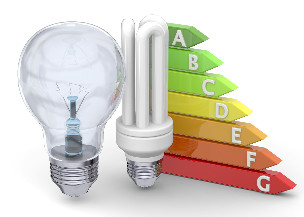Efficient energy, sometimes called energy efficiency and energy conservation, is to reduce the amount of energy required to provide products and services.
Energy efficiency and conservation can be defined as the energy consumption for this service and, normally, they refer to the improvement of this relationship.
Energy efficiency involves improving the technique of the energy characteristics of the mechanism of delivery of different types of energy, but also may include better management or organization of energy consumption.
The energy is inextricably linked to socio-economic development, so that it is easy to imagine that this trend can be a means to achieve political objectives outside the energy sector. Some outcomes may be indirect, or be the result of a chain of actions, which are difficult to relate to this concept.

However, we can assume that measures to improve the energy efficiency and energy saving have an impact on the different areas of the economy, often in different areas simultaneously, and a direct impact in one area of the economy can affect another.
Traditionally, most attention in this field on the use of less energy for the same energy services. However, it can also increase the volume of services for the same amount of energy consumed.
Therefore, the energy efficiency can be achieved in the case that it is a lower consumption of energy to provide the same level of services, or the same amount of energy that is consumed for a higher level of services. Energy efficiency measures and saving energy can be focused on:
- rational energy consumption;
- the power saving mode.
Energy efficiency and conservation is an important aspect and the focus was on activities, such as the reduction of losses in electricity production or an increase in the industrial activity. Important in both forms.
The understanding of the wave effect that may occur as a result of increasing energy efficiency in the economy could be useful in the development of policies.
Here, the different benefits of the efficient use of energy in the individual/sectoral/national/international typology. Multiple benefits of energy efficiency and energy saving: the increase can yield substantial multiple benefits across a wide range of sectors.
A list of the many wider benefits that can be obtained with these measures:
Advantages in energy efficiency and energy saving
Health and well-being
Especially clearly demonstrated the positive impact of energy efficiency and energy savings in the real estate sector, and health-related social consequences. A wide range of diseases, especially pulmonary disease and from asthma among children are closely associated with the cold, the humidity and mold in dwellings.
Energy efficiency and energy saving in the construction sector, in particular, can lead to a wide range of tangible benefits for the health of the residents of the homes, office workers and many other groups and the population as a whole. Health effects also because of the inefficiency of the home and appliances.
The fight against poverty and affordability of energy
In the context of high energy prices and the financial constraints of the poor often can't afford enough services to maintain a healthy living conditions, forced it is not enough to heat the house to endure the poor quality of the air in the premises and/or sacrificing other needs, such as food: a phenomenon sometimes known as "heat or food". This situation is usually described as "fuel poverty." Energy efficiency and conservation can solve the problem by taking measures at the household level, to reduce energy costs through insulation and design, supply efficient equipment for heating and water heating, and lighting, as well as training in the effective use of energy among residents.
Access to energy services is fundamental to the liberation of people out of poverty through the provision of raw materials for the socio-economic development. Measures to improve energy efficiency made by energy suppliers can free up additional resources to reduce technical losses in the systems of production and distribution of energy.
Industrial productivity and competitiveness
There are many improvements in the productivity of industry, which can provide energy efficient production and energy saving. These include the increased profit, safer working conditions, consistency and improvement of the quality and production lower capital and operating costs and the reduction of scrap and energy. Benefits can be received by these industries on a global level through increasing competitiveness and can extend to the daily lives of the working conditions, safety and job satisfaction of individual employees.
Benefits for energy suppliers and infrastructure

At first glance it may seem that the energy efficiency and conservation contrary to the commercial interests of the suppliers of energy. However, the research shows that energy providers receive many benefits from the point of view of the provision of better energy services to customers, reduce operating costs and increase profits.
Up to 10% of the profits derived from measures to increase are likely to accrue directly to energy providers, which explains why many utilities are already taking ambitious measures to manage demand, to stimulate, in many countries legislative obligations in this area.
The increase in the value of the assets
There is some evidence that investors are willing to pay a rental premium for the sale of real estate, with better energy performance.
For example, energy is one of the highest operating cost in most offices, so that the net present value of future energy savings can be added to the resale value. Studies have shown that the market increasingly reflects these arguments.
Existing analysis of the data shows that green buildings have increased resale value and prices, and also offer a wider range of benefits, even beyond the value of the asset: they have higher rates of employment, increased comfort, lower maintenance costs and lower capitalization rates and higher productivity gains.
The creation of jobs
Investments in energy efficiency programs and energy efficiency have significant potential to create jobs with short time. The network for the improvement of the employment can be explained by the improvement of programs in direct through job creation and indirectly through consumer surplus spending, in addition to other benefits to the budget, such as the reduction of unemployment benefits. Direct jobs created during the implementation of measures to improve the energy efficiency and conservation are the easiest to measure, and is likely to be a large amount. Indirect jobs can also be created in the production of the raw materials, however, these jobs can be preserved only during a particular program.
The reduction in public spending related to energy is the future of the public sector as a separate economic entity. Energy efficiency and conservation to contribute to the reduction of the burden on the national budgets and improve the balance tax.
Energy security
Energy efficiency plays an important role in the reduction of the dependency of countries on imports to cover its needs and thus contributes to the formation of a variety of energy balance. Consequences that pervade the energy security, are structurally dependent on the energy sector in the country.
Effects macroeconomic
Energy efficiency and conservation can lead to important positive impacts macroeconomic such as GDP, trade balance, economy restructuring, employment, and national competitiveness. Can have a significant impact on the country's budget. The investments in this direction which involve a transfer of capital from energy to less energy-intensive activities.
This can have important implications for the economics and management of energy in General, if the translation involves the restructuring of the economy on a more labour-intensive activities.
The reduction of emissions of greenhouse gases
Energy efficiency and conservation reduce the consumption of fossil fuels, energy and reduce greenhouse gas emissions. In fact, the measures that are expected to contribute 44% reduction in carbon emissions by 2035, in order to have the opportunity to achieve the international goals in the field of climate change.
In comparison with other measures of reduction of greenhouse gas emissions, improve energy efficiency, as a general rule, it is more cost-effective and can be implemented quickly. The reduction of emissions has already been recognized as one of the main results of the measures to increase energy efficiency and are often already measured as a course in the evaluation of existing programs.
The decline in energy prices

The decline in energy prices depend on a number of factors such as the level of energy supply, energy demand and market conditions. All other things being equal, if the demand for services will decrease, energy prices should fall, and it is expected that the energy efficiency and conservation will provide the necessary reductions in energy demand.
Management of natural resources
Another advantage of reducing the demand for energy is to relieve the pressure on natural resources.
Given the fact that by 2035, global production of crude oil and conventional oil will decrease the energy efficiency and conservation will be increasingly important measure to relieve the pressure on the limited resources. Objective of sustainable development international development the responsibility and the access to energy services modern it is crucial to ensure the basic needs of life, as well as the conditions for socio-economic development.
























